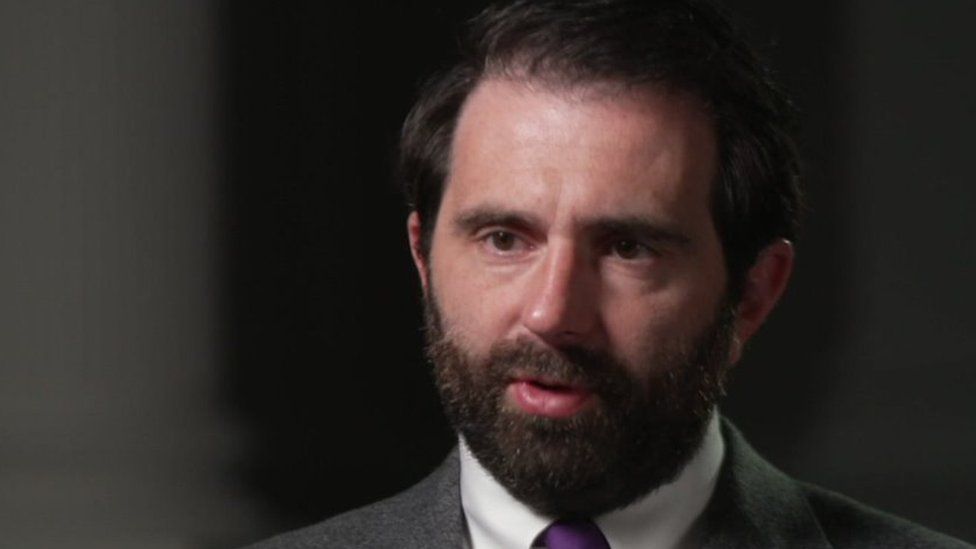ARTICLE AD BOX

By Chas Geiger
BBC Politics
The UK is a "permissive environment" for antisemitism, a Home Office adviser has said.
Writing in The Times, Commissioner for Countering Extremism Robin Simcox said a good test of a society's health was how it treated its Jews - and, by this metric, the UK was "very sick indeed".
Security minister Tom Tugendhat denied this, arguing threats to any community were taken "extremely seriously".
Police have recorded a steep rise in antisemitic incidents since 7 October.
On that date, Palestinian militant group Hamas launched a series of attacks on Israel, killing more than 1,400 people and taking more than 200 hostages.
More than 3,000 people have been killed in Gaza since Israel launched retaliatory air strikes, and a ground offensive is expected.
In his Times article, Mr Simcox said tens of thousands of British citizens had gone online and taken to the streets to voice support for "Palestinian resistance".
He accused them of "successfully exploiting one of our proudest British values - free expression - to pursue a shameful extremist agenda, the normalisation and promotion of antisemitism", adding that this must be a "wake-up call for all decent people".
Mr Simcox argued the UK was paying the price for a "three-decade long failed policy mix of mass migration and multiculturalism".
The country was one of the world's most successful multi-ethnic democracies, but that relied on "a basic level of integration", he said.
Asked about the comments, Mr Tugendhat told Times Radio he did not agree.
"You just have to look at the response over the last 10 days - the way the prime minister, the home secretary, and I and many others have been reaching out to the Jewish community, making sure policing is appropriate... to give reassurance.
"The way in which we've been engaging as well with the Muslim community, some of whom are feeling also vulnerable at this time, feeling stigmatised."
He also emphasised that freedom of speech was "absolutely fundamental" to democracy, calling it "the basis in fact of every other liberty".
Mr Tugendhat drew a distinction between "perfectly legitimate" support for Palestinians and the promotion of Hamas, a banned terrorist group in the UK, which he said should result in arrests.
'Alarmed'
He also disputed the suggestion that multiculturalism had failed, describing the UK as having "phenomenal success in bringing people together".
"Many people speak different languages at home, identify with different cultures, and are able to mix all of them extremely effectively," he said.
In an interview with BBC Newsnight, Mr Simcox said the threat from extremism in the UK was "extremely disturbing... at the moment" and had "got much worse" since the Hamas attacks.
Things felt "tenser, the stakes feel higher", he said, adding that he had been "alarmed" by the number of people who had come out on to the streets.
He said the government had "got better" in countering extremism in the past couple of years, but the risk posed by Hamas and Iranian networks in the UK had been "a bit of a blindspot".
Previously Hamas "maybe… wasn't viewed as being quite as pressing a security threat to the UK as we may now view it in the wake of what's happened in Israel," he added.
Mr Simcox said he was "out of patience" with what he described as "cultural timidity" in tackling radical ideology in Britain - and he called for an "an honest conversation about where the terrorist threats and extremist threats are in this country".
"Because just like every terrorist atrocity, 9/11, 7/7, Manchester Arena, I mean take your pick, Charlie Hebdo, memories fade, anger fades, outrage fades and inertia creeps in and we kind of revert to the status quo.
"I can tell you from my point of view that I have no intention of letting what happened in Israel, the impact it has on UK communities, drop."
Mr Simcox was appointed as commissioner for countering extremism by then-Home Secretary Priti Patel in July 2022, having performed the role in an interim capacity since March 2021.
He is a former research fellow at the Henry Jackson Society, a think tank that advocates the spread of liberal democracy, and a former Margaret Thatcher Fellow at The Heritage Foundation's Margaret Thatcher Center for Freedom.

 1 year ago
24
1 year ago
24








 English (US) ·
English (US) ·